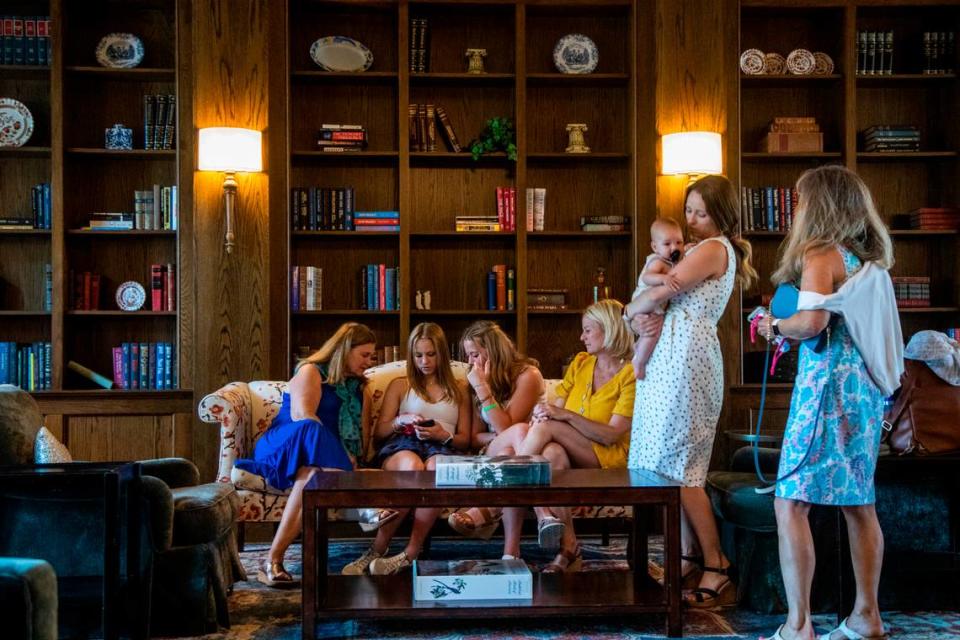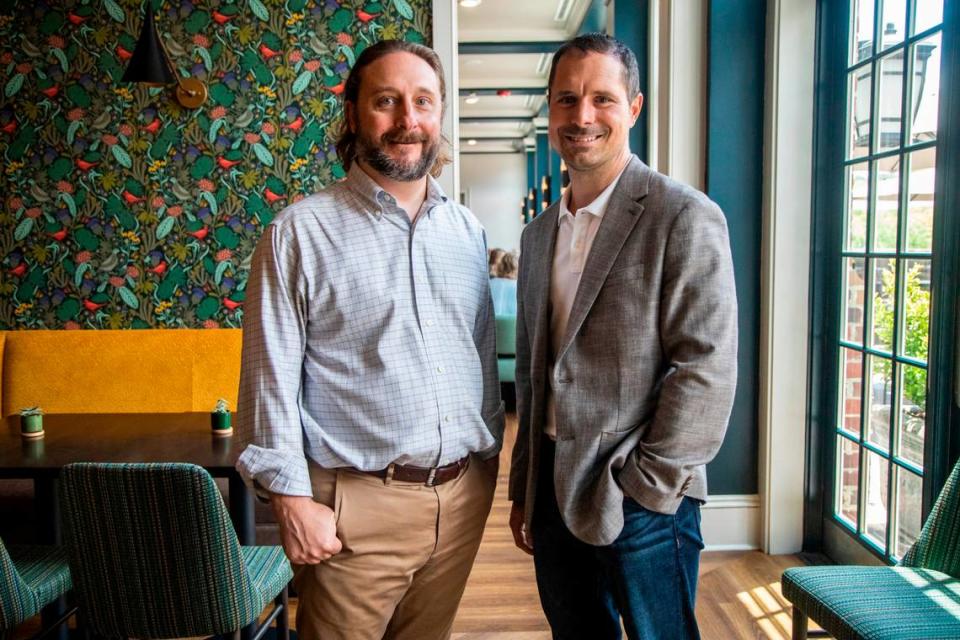Downtown Cary’s hotel went bankrupt. Hometown developers teamed up to save it.
When The Mayton Inn was put up for sale, competing local developers who own many of the properties around it naturally thought it would be a good idea to add downtown Cary’s only hotel to their real estate portfolio.
The hotel’s operators filed for bankruptcy in 2018 and it was put up for sale in a foreclosure auction the following year.
That’s when Bill Zahn of Triangle Residential Development Company saw an opportunity for collaboration rather than competition. Now the 45-room boutique hotel at 301 S. Academy St. operates as The Mayton, a result of Triangle companies pooling their capital and efforts.
Talks began before the pandemic with fellow hometown developers George Jordan III and Jordan Gussenhoven while local investment firms were brought into the conversation.
“Considering we have $70 million worth of projects going on right next to it and George and Jordan probably have another $70 million, we got together to save the hotel,” Zahn told The News & Observer.
As development partners in their company Northwoods Associates, the uncle and nephew duo of Jordan and Gussenhoven has built much of the new development in downtown Cary.
“I don’t think it was on our radar screen to get into hospitality,” he said. “All Jordan and I cared about was that the hotel, whoever took over the hotel would would run it successfully, and that it would be an asset, because everybody wants quality development. We want good retailers down here, good office down here, good operation.”
After hearing Zahn’s proposal, they partnered with him along with Cary real estate investment firms Integrated Asset Advisors and Monument Property Group to submit an offer for the hotel in the spring of 2020.
Developers enter the hotel business
“None of the developers that purchased this are in the hotel business and it wasn’t like we really wanted to be,” said Zahn. “But we really wanted to make sure that this asset was renovated in this key part of the downtown experience. Sometimes you just have to do this.”
Even as the pandemic swept into the state, the developers committed to the deal and closed on the hotel in June 2020 for $8.1 million.
“We knew it was tough time in the hospitality industry everywhere, but we knew it was more important for us in the long term looking 20 years out rather than two years out,” Zahn said.
They chose to keep the hotel open and start the renovation process last summer since hotel occupancy was low. The Mayton is now seeing new life with booked rooms and event spaces as the pandemic subsides and continues to undergo piecemeal renovations and service changes.

The Mayton’s future relies on the successful growth of the town’s core as developments go up around it, including the town’s adjacent redevelopment of the seven-acre Academy Park, which will rebuild the landscaping and create an area for outdoor events. Zahn is involved in that project along with Steven Knier, who is one of the investors behind The Mayton.
Just next door to the hotel, Zahn’s firm has development underway on The Walker, a luxury apartment complex that will wrap around the town’s parking deck when completed early next year located on S. Walker Street.
“George and Jordan in their projects in downtown have a vested interest in what’s happening and how downtown Cary develops, and so do we,” said Grant Yarber, president of Integrated Asset Advisors. “So it doesn’t hurt to collaborate and cooperate with your competition on occasion. In fact, it’s a good thing.”
Local hoteliers in charge
The development partnership developed a relationship with Triangle hospitality company Early Bird Night Owl, whose boutique hotel management experience at The Durham qualified them for transforming the once-bankrupt hotel, starting with removing “inn” from its name.
“Although we have a lot of ties and roots in the Triangle-area hospitality market, downtown Cary wasn’t a location we had ever worked in before,” Craig Spitzer, cofounder of Early Bird Night Owl, told The N&O.

“We’ve definitely taken what we think is more of a hotelier’s approach because at 45 rooms and a growing downtown — with a full-service restaurant, a lot of banquet and event space — (we) bring more of a hotel mentality to the table, which is more of a full-service 24-hour around the clock approach to providing a place for our guests in our community.”
New touches to the hotel include custom wallpapers made by the Durham-based company Spoonflower and featuring artwork from local artists. Changes are still pending in the upstairs hallways and in guests’ rooms as well as in the outdoor dining terrace.
Being able to begin working in an operating hotel allowed for a “repositioning” rather than starting from scratch, meaning that changes are based on real time rather than speculation, Spitzer said.
“We’re preparing to invest more in the transformation (than planned),” said Shipley. “It’s a moving target.”
The complete renovation as envisioned by Spitzer and Shipley will include new guest programs and new dining room and likely will be finished early next year, they said.
“Here are two (developers) who had major development projects going on just a few blocks away from each other and then, in theory, would be competing, saw this particular hotel as a way to come together to partner for the good of the community, to create something that would be lasting,” said Spitzer.

